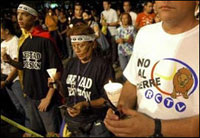Venezuela: Government and opposition battle to control mass media
Protesters clashed with the police in Caracas during a demonstration against a decision by President Hugo Chavez that forced a critical television station off the air.

The RCTV station is no longer in the Venezuelan air. After years of critical emissions of President Hugo Chavez, including an open support to a military coup in 2002, the station has been replaced on Monday by a State-run TV channel which offers artists singing pro-Chavez music, exercise programs and a talk show interspersed with government ads proclaiming, "Now Venezuela belongs to everyone."
Furious viewers, opponents to the President, filled the streets of Caracas in protest for the government’s decision to refuse to renew the RCTV’s broadcast license. National Guard troops, who love the official pro-Chavez music, fired tear gas and rubber bullets into a crowd that challenged new programs. TV networks of other Latin American countries turned black their screens to protest the decision.
All along Monday, university students blocked one lane of a major highway hours after Radio Caracas Television ceased broadcasting at midnight. Chavez had refused to renew RCTV's broadcast license, accusing it of "subversive" activities and instructed his collaborators to investigate other local and international TV networks as Globovision and the CNN.
Venezuela's government asked the attorney general to investigate Time Warner Inc.'s Cable News Network and local television station Globovision for ``lies'' and inciting violence against President Hugo Chavez. Communications and Information Minister Willian Lara said CNN last week falsely portrayed a Mexican protest as being in Caracas and displayed images of Chavez alongside an al-Qaeda leader. Globovision, a 24-hour news channel, ran scenes from the 1981 attempt to kill Pope John Paul II, which Lara said was incitement against Chavez.
"This is an effort to associate Hugo Chavez with two things, violence and death,'' Lara said in a televised news conference on Monday in Caracas. "CNN lies about Venezuela.''
As the opposition protested, thousands of government supporters reveled in the streets as they watched the midnight changeover on large TV screens, seeing RCTV's signal go black and then be replaced by a TVES logo. Others launched fireworks and danced in the streets.
Inside the studios of RCTV - the sole opposition-aligned TV station with nationwide reach - disheartened actors and comedians wept and embraced in the final minutes on the air. They bowed their heads in prayer, and presenter Nelson Bustamante declared: "Long live Venezuela! We will return soon."
Founded in 1953, RCTV regularly topped viewer ratings with its talk shows, sports, soap operas and comedy programs. But Chavez accused the network of helping to incite a failed coup in 2002, violating broadcast laws and "poisoning" Venezuelans with programming that promoted capitalism. RCTV's managers deny wrongdoing.
According to the government, TVES will be more diverse than its predecessor and will include up to 70 percent of local produced emissions. "We've come here to start a new television with the true face of the people, the face that was hidden, the face that they didn't allow us to show," said Roman Chalbaud, a pro-Chavez filmmaker appointed by the government to TVES' board of directors.
The European Union said it was concerned by the decision to replace Venezuela's most popular television station with a new state-backed public service channel without allowing open competition and a tender process for a new broadcast license. "Freedom of speech and freedom of the press are essential elements of democracy," said the EU presidency, currently held by Germany.
Supporters of Hugo Chavez often accused RCTV of backing plots against the President and threatening national institutions. Days before December presidential elections, pro-Chavez militants said that the opposition were hiding weapons and vehicles inside RCTV premises to overthrow the government. They even had plans to attack the building in case of turmoil.
Most of the press is in private hands in Venezuela nowadays. However, since Chavez was first elected president, the government spent lots of money to strengthen public media controlled by the government.
As a result, the offer to viewers is split in pro and anti-Chavez stations. Private emissions are openly anti-Chavez, while public broadcasts back all presidential initiatives. No independent media can be found in Venezuela.
Hernan Etchaleco
Subscribe to Pravda.Ru Telegram channel, Facebook, RSS!


